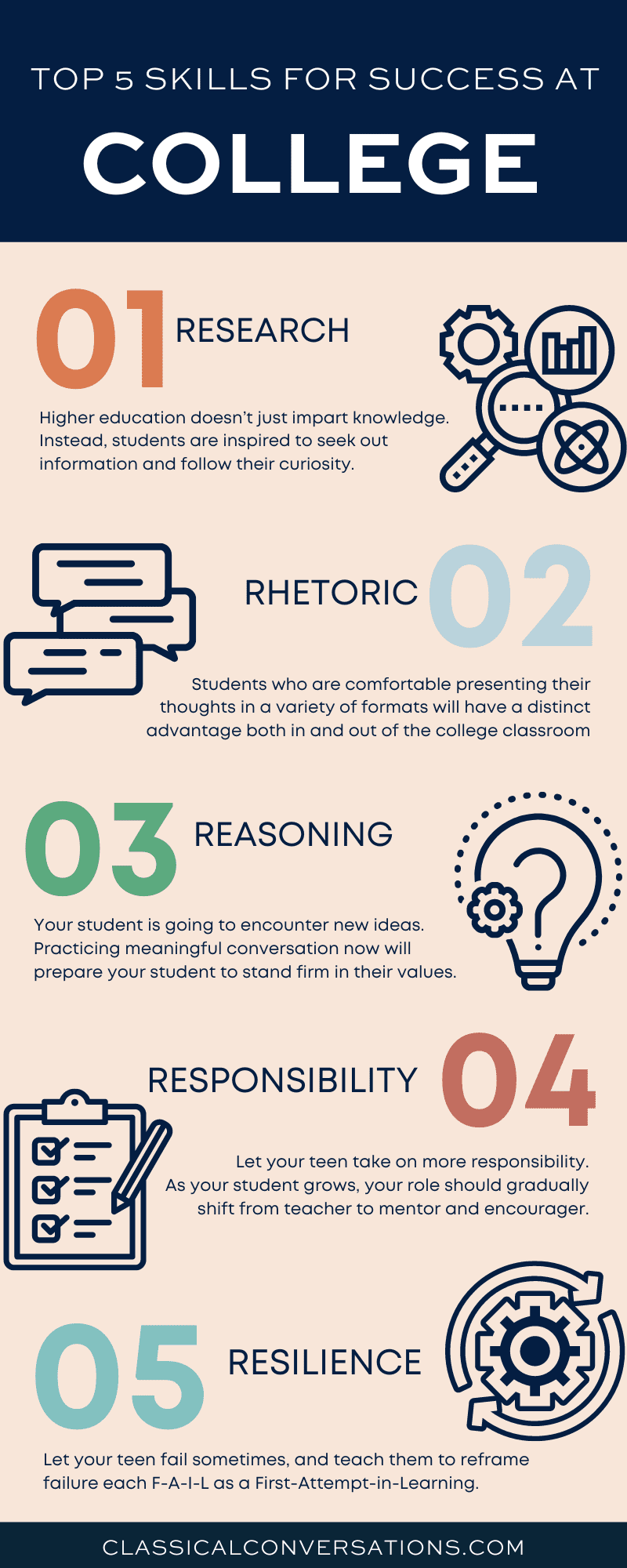Check out any college prep blog and you’ll find a standard to-do list for getting into college or earning a top scholarship.
- Get a great GPA.
- Score well on the SAT, ACT, and CLT.
- Rack up extra-curricular activities and volunteer hours.
And I agree. Checking all these boxes is great preparation for the college application and admission process. While these measures of college-readiness say a lot about a student’s high school successes, they may or may not produce the skills needed to help your student navigate college successfully.
Twenty-first century college education requires more than excellent reading, writing, and arithmetic skills, and classical education provides an sturdy foundation.
Classically educated grammar students learn valuable skills through recitation, memorization, and presentation.
Dialectic students begin the transition to college prep work by developing sophisticated analytical research, reading and writing skills at an early age.
But it is in the rhetoric stage where I believe that the best college prep takes place as students develop higher thinking skills that are essential to success in the college classroom.
Top 5 List of Essential College Prep Skills
Here are the five skills college students need:
1. Research
In high school, students should begin to approach all learning as research. When they read, they should annotate, analyze, and seek authoritative sources to gather new insights and information.
Professors are subject matter experts, but their role is not to simply transfer knowledge to students through texts, lectures, and study guides. Instead, one goal of higher education is to spark curiosity and to encourage students to pursue deeper understanding of any topic through research.
Students who have completed a significant research project in high school will be well-prepared for college.
2. Rhetoric
21st century students will need to present their ideas in a variety of formats and on a plethora of new platforms.
High school writing assignments should vary widely so that students become comfortable converting an idea into a five-sentence summary, expanding it to a five-paragraph essay, and expounding on it in a five-to-15-page paper using modern style and citation formats.
Students should also practice speaking both in person and on camera as college assignments may include recorded submissions. Becoming comfortable presenting their thoughts in a variety of formats gives students a distinct advantage both in and out of the college classroom.
3. Reasoning
Your student is going to encounter an overwhelming number of new ideas in college. They may have a roommate from a very different background or classmates who disagree with their belief systems. It may be the first time that your student encounters an authority figure who doesn’t share their religious or ethical beliefs.
Socratic discussions and exercises in identifying fallacies and bias provide excellent training for difficult classroom discussions or late-night philosophizing with roommates. Practicing deep, meaningful conversation now will prepare your student to stand firm in the verbal sparring matches that young adults love to engage in.
4. Responsibility
Growing in responsibility is a given for teens, and parents are happy to encourage driving, part-time jobs, and chores.
Can I encourage you to also let your teens take responsibility for their education?
Let them choose a summer college course. Let them communicate with their advisor and professors on their own. Let them complete their own college applications and turn in assignments that you haven’t reviewed.
As your student grows, your role should gradually shift from parent/teacher to mentor/encourager.
5. Resilience
I encourage you to let your teen fail sometimes.
Very often, bright students arrive on campus never having earned a low grade, and this can leave them wildly unprepared for their emotional response to earning (gasp!) a C or below on a quiz or a test.
Teach your student to reframe how they view failure. Teach them that to F-A-I-L is nothing more than a First-Attempt-in-Learning.
Help them learn to navigate a perceived failure with dignity and grace, and they will earn first self-respect, followed by the respect of their professors and peers.
How Can a Summer Dual Enrollment Course Help Develop These Skills?
Because college-ready high school students who take even just one summer course for dual credit can experience the responsibility of being required to advocate for themselves, the resilience that comes from having a subject-matter expert critique their work, and the real-world experience of practicing rhetoric, reasoning, and research outside the safe cocoon of their homeschool or CC community.
When a student is ready for the challenge, dual enrollment can be an essential part of 21st century college prep, and there are excellent Christian colleges that offer summer courses online or on campus.
Before you select a college, I recommend that you watch Don’t Let College Undermine Your Student’s Faith by Cedarville University President Dr. Thomas White.
And as you consider college prep and check off the items on that traditional college application checklist, I encourage you to consider supplementing your student’s classical education with one or two dual-credit college courses.
Resources
Read more about CC Plus’ college credits for homeschoolers program, or visit the CC Plus program page.





